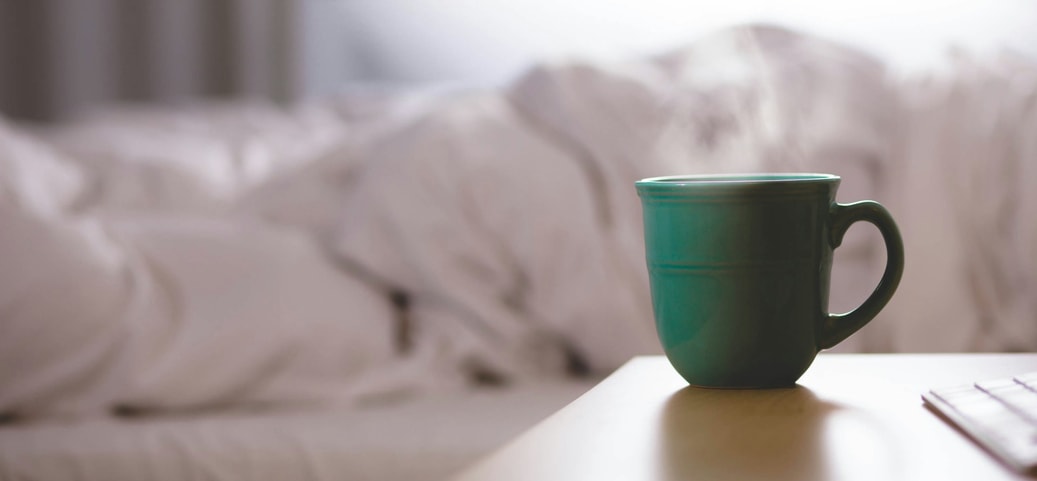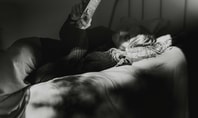Coffee before bed: what you should know about caffeine in the evening
Do you love the smell of fresh coffee and can't imagine a day without your favourite drink? Then you've probably already asked yourself whether you should treat yourself to a cup of delicious coffee before going to bed. Because while some people drink coffee in the evening and sleep soundly afterwards, others lie awake for hours after their evening caffeine intake. We take a closer look at how caffeine affects the body and mind before sleep. We also want to give you some tasty and sleep-promoting alternatives if you don't want to go without a hot drink in the evening.
by CALIDA
February 5, 2025•5 min reading time

Coffee in the evening: How caffeine affects your sleep rhythm and your health.
A few important points
For many people, having coffee in the evening affects their quality of sleep and can lead to problems falling asleep.
It is often recommended that you stop drinking coffee four to six hours before going to bed in order to avoid potential sleep problems.
The effect of coffee varies for each individual: while some people barely react to caffeine, others suffer from sleep problems even after a single espresso in the afternoon. This can lead to persistent tiredness the next day.

Coffee in the evening: a pleasure or a risk to falling asleep?
There are situations in which a cup of coffee in the evening sounds particularly tempting – for example after a long dinner, to stay alert and on good form during a long games evening, or simply as a delicious treat before going to bed. Some people even believe that a small espresso as a late dessert stimulates digestion.
But the question arises as to whether late-night caffeine consumption is counterproductive if you want to sleep peacefully afterwards – after all, it is well known that coffee makes you alert and stimulates the brain. So should you avoid coffee in the evening?
The effect of caffeine on the body and brain
To understand why many people avoid drinking coffee in the evening, we need to take a closer look at the reactions in the body and brain – because this is where caffeine blocks the receptors for adenosine, a substance that, among other things, makes us feel tired.
By blocking these receptors, we stay awake for longer. This effect can last between two and eight hours – depending on individual factors such as age, metabolism, coffee habits and our genetics.
But why are some people still able to drink coffee in the evening and sleep peacefully afterwards? This is usually due to their personal sensitivity to caffeine. Some people are simply less susceptible, while others feel a strong sense of alertness as soon as they consume even tiny amounts of caffeine.
Does having coffee before going to bed affect quality of sleep?
The question of whether drinking coffee before going to bed really interferes with sleep cannot be answered with a definite ‘yes’ or ‘no’. For most people, drinking coffee late in the day does indeed have a negative effect on the ability to fall asleep and the quality of sleep. They lie awake for longer, feel restless, or they fall asleep but do not have a deep, restful sleep.
Others, on the other hand, have become so accustomed to caffeine that their bodies break down the substance quickly or their receptors react less strongly. These people can easily enjoy a small espresso before going to bed and still fall asleep and stay asleep without any difficulty.
But be careful, it can be assumed that the effect of caffeine has a subliminal influence on sleep even for these ‘exceptions’. Even if you feel like you fall asleep quickly, your sleep may be lighter and thus less restful.
How long before going to bed should you stop drinking coffee?
If you react to caffeine and are more alert and productive after a cup of coffee, you should avoid it in the evening. But when should you drink your last coffee of the day? A rough guideline is four to six hours before going to bed.
Some experts recommend drinking your last coffee in the afternoon – at 4 pm, for example. If you go to bed at 11 pm, you’ve given the caffeine enough time to break down for the most part.
Listen to your body
If you are very sensitive to caffeine or even suffer from a mild sleep disorder, it’s better to play it safe and reduce your coffee consumption in the early afternoon. On the other hand, people who don’t feel any effects at all in the evening can try shorter intervals. For some, a break of just two or three hours may be enough.
The best alternatives to an evening coffee: calming and tasty
If you want to avoid caffeine in the evening but still feel like a hot drink, there are plenty of alternatives that are not only delicious but can even improve your sleep!
Herbal teas: Lemon balm, lavender or chamomile – many herbal teas help you relax and create a real feel-good moment in the evening. If you prefer more intense flavours, try a warming spiced tea.
Decaffeinated coffee: The typical coffee flavour is retained, but as much of the caffeine as possible has been removed. Perfect for all coffee fans!
Cereal coffee: Chicory coffee or blends of barley and rye do not contain any caffeine but still taste malty and bitter.
Warm milk: On its own or combined with honey, this is a time-tested and tasty home remedy that gently puts the body into resting mode.
With these delicious hot drinks, you don’t have to give up your evening treat and your routine – but you avoid the risk of lying restless in bed later on.
From morning to evening: the optimum coffee consumption throughout the day
In addition to the question ‘Coffee in the evening – yes or no?’, you might also be wondering how much caffeine is okay throughout the day. After all, for many people, coffee is a passion that begins in the morning and continues throughout the day.
Nevertheless, you should not indulge in excessive consumption. Here are the most important tips:
Moderation: Two to four cups a day are generally considered fine for healthy adults.
Night work: If you work late or shifts, you might want to drink a coffee at night to stay alert. If this is the case, you should closely monitor how your body reacts and consider alternatives (e.g. short movement breaks).
Personal changes: How your body breaks down caffeine can change with age or due to certain illnesses or medications. Your diet also plays a role in how you metabolise caffeine.
It’s important to keep an eye on yourself and your body so that you can adjust the amount of caffeine to suit your individual well-being. Because remember, while some people drink a whole pot of coffee a day without any problems, others are very sensitive to caffeine – sometimes the active ingredient can even increase anxiety and cause other psychological and physical effects!
In conclusion
Coffee before sleep: for many an absolute no-no, for some it’s just part of their routine. Although it has been scientifically proven that caffeine before sleep can be counterproductive and make it difficult to fall asleep, there are people who do not feel any adverse effects even after a late espresso. There are several reasons for this:
Genetic predisposition: Every body breaks down caffeine at different speeds. The enzyme that breaks down caffeine is particularly effective in some people.
Habituation effect: People who have been drinking a lot of coffee for years develop a tolerance. The stimulating effect is no longer as pronounced, which is why an evening coffee has less of an impact.
Mental attitude: A relaxing ritual can calm the body, even if the caffeine theoretically stimulates the mind. The feeling of relaxation from the enjoyment of the coffee can actually be stronger than the stimulating effect.
Ultimately, it all depends on how you feel in the evening and the next morning: if you wake up feeling refreshed and are productive during the day, there’s no reason to avoid a cup of coffee in the evening. If you have trouble falling asleep, on the other hand, it’s a good idea to enjoy your last cup of coffee about four to six hours before going to bed.
If you don’t want to miss out on that much-loved taste in the evening, opt for mild alternatives such as decaffeinated coffee or cereal coffee. Calming hot drinks include herbal teas or warm milk with honey. These can even help you sleep!
Discover more interesting blog posts:


